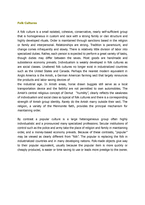영문 Folk Cultures 영어작문
A folk culture is a small isolated, cohesive, conservative, nearly self-sufficient group that is homogeneous in custom and race with a strong family or clan structure and highly developed rituals. Order is maintained through sanctions based in the religion or family and interpersonal. Relationships are strong. Tradition is paramount, and change comes infrequently and slowly. There is relatively little division of labor into specialized duties. Rather, each person is expected to perform a great variety of tasks, though duties may differ between the sexes. Most goods are handmade and subsistence economy prevails. Individualism is weakly developed in folk cultures as are social classes. Unaltered folk cultures no longer exist in industrialized countries such as the United States and Canada. Perhaps the nearest modern equivalent in Anglo America is the Amish, a German American farming sect that largely renounces the products and labor saving devices of the industrial age. In Amish areas, horse drawn buggies still serve as a local transportation device and the faithful are not permitted to own automobiles. The Amish몶s central religious concept of Demut 몷humility몸, clearly reflects the weakness of individualism and social class so typical of folk cultures and there is a corresponding strength of Amish group identity. Rarely do the Amish marry outside their sect. The religion, a variety of the Mennonite faith, provides the principal mechanism for maintaining order.
By contrast a popular culture is a large heterogeneous group often highly individualistic and a pronounced many specialized professions. Secular institutions of control such as the police and army take the place of religion and family in maintaining order, and a money-based economy prevails. Because of these contrasts, 몷popular몸 may be viewed as clearly different from 몷folk몸. The popular is replacing the folk in industrialized countries and in many developing nations. Folk-made objects give way to their popular equivalent, usually because the popular item is more quickly or cheaply produced, is easier or time saving to use or leads more prestige to the owner.




 분야
분야


